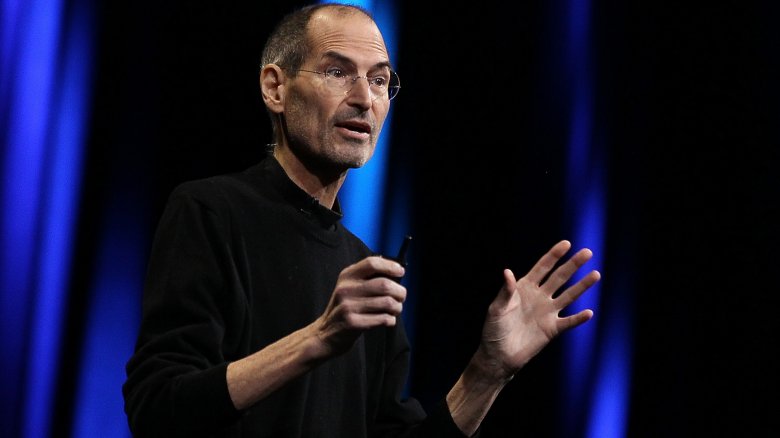Steve Jobs' Uniform Finally Explained
When you hear the word "Apple," you probably think of a either delicious fruit or a guy named Steve Jobs. Jobs' life story, of course, is one for the ages. A foster child who became a college dropout, according to Biography, his creative vision and funding proved instrumental in revolutionizing technologies such as the personal computer, MP3 players, cell phones, the animation industry (with Pixar), and more. His personal life was certainly messy and problematic, with a daughter he refused to recognize for years and a history of abusive behavior toward friends and employees, according to Business Insider, but there's no arguing the man's impact on culture, society, and the world.
In a world increasingly loaded with titans of technology, Jobs stood out from the crowd, and at least one key aspect of his iconography was the famous black turtleneck sweater he wore every time he stepped before a big glittering screen. Why that minimalistic look, though? What might cause a man with so much creative vision, passion, and privilege to wear the exact same outfit every day?
It all started in Japan. When Jobs visited the East Asian country in the 1980s, according to CNET, he loved how all of Sony's employees wore a uniform, and he decided that getting Apple's staff to do the same thing would be a great way to build team solidarity. He sought out Japanese designer Issey Miyake, who had designed the Sony uniforms, and commissioned Apple uniforms consisting of a nylon vest with removable sleeves. When he excitedly brought these outfits back to the U.S. ... well, you can imagine how the crew reacted. Imagine if you wore T-shirts to work every day and your boss suddenly said everybody had to wear goofy vests. As Jobs later told his biographer, Walter Isaacson, "Oh man, did I get booed off the stage." Needless to say, the Apple team roundly rejected the idea of dressing like a bunch of 1960s Starfleet officers. Not that Starfleet doesn't have its place, but still.
Jobs didn't quite give up on the idea, though. Back then, NBC says he was known for having a quite dapper and stylish sense of fashion, ranging from leather jackets to bowties, but being the visionary he was he saw the potential power in creating a definitive, iconic look for himself that could also represent Apple as a whole. The more Jobs thought about it, the more he liked the idea of wearing his own uniform, both for its stylistic components and its convenience. Since he had maintained a friendship with Miyake, he eventually bit the bullet and had the Japanese designer make him a whole bundle of identical black turtlenecks.
Why black turtlenecks? Because he liked them, of course. How many? Try 100, according to Walter Isaacson. Apparently Jobs kept them all neatly folded, too, and one imagines he never had to sort them. After that, he simply climbed into those blue jeans and New Balance sneakers, and his outfit was forever set in stone.
It's quite possible that Jobs never needed to buy shirts again, but after his death, the Hollywood Reporter wrote that sales of black turtlenecks shot through the roof. However, any ol' black turtleneck isn't necessarily a Steve Jobs turtleneck, so in 2017, Issey Miyake's company started retailing a garment called Semi-Dull T that closely imitated the Jobs sweater. Semi-Dull T is a bit of a weird name, yes, but it sold for a very not-weird $270 a pop, according to Bloomberg.
Though Steve Jobs certainly receives a great deal of credit for his tech innovations, his influence on the fashion of today's crop of entrepreneurs often goes unmentioned: If you think about it, Jobs was the major figure who made it okay for future tech titans to leave their suits and ties in the closet. He paved the way for people like Elon Musk to wear leather jackets with Rick and Morty shirts underneath, and for controversial Facebook founder Mark Zuckerberg to just throw on gray T-shirts every day. By the way, if you thought Jobs' sweaters were overpriced? Take a gander at those boring Zuck shirts, which apparently retail for $300-$400 each, according to Fortune. For that price, those shirts better have magical self-cleaning properties.
